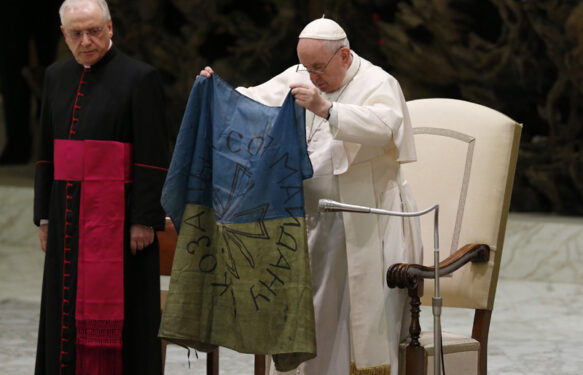Pope Francis faces ‘much more complicated’ situation than his predecessors
PROSPECT HEIGHTS — As Russia wages war against Ukraine, and China continues to threaten Taiwan, what might a new cold war mean for the Church, and how relevant are past papal diplomatic approaches?
“I’m not sure, politically,” said Massimo Faggioli, professor of theology and religious studies at Villanova University. “But from the point of view of religion, and the Catholic Church, it is fundamentally different.”

The Cold War of the 20th century, he said, pitted the West against the Soviet Union in “political, military, and ideological conflict.” While those factors also exist now in the West’s faceoff with Russia over Ukraine, there is another critical element that did not exist then: religious conflict.
Where the Cold War brought Catholic and Orthodox Churches together in a kind of ecumenical unity against communism, Faggioli said, the current war between Russia and Ukraine is also “a war between the two largest Orthodox churches in the world,” those of Russia and Ukraine.
They “are not just political, ideological enemies,” Faggioli added of the warring countries. “They are religious enemies.”
“This makes the Holy See’s efforts at diplomacy much more complicated,” he said. Along with the normal Vatican diplomatic “playbook” of “not demonizing” one side while pursuing the possibility of mediation, there is the additional long-term concern of not being seen as favoring one national church over another during the current conflict.
While Pope Francis has avoided specifically naming Russia or Vladimir Putin, “I think he has made it quite clear who he is talking about” when he condemns the war’s atrocities, Faggioli said. “But how is this perceived by Ukrainians, and by Ukrainian Catholics? You can understand the frustration they feel, that the enemy is not named.”
Pope Francis’ cautious approach to condemning Russia’s war against Ukraine seems to be different than the Ostpolitik (new Eastern Europe policy) employed by Pope Paul VI in trying to advance dialogue with the Soviet Union.
While Pope Paul VI undertook Ostpolitik to try to “open the door” to Church engagement with the Soviet Union, Pope Francis had already engaged with Russian leader Vladimir Putin prior to the current crisis, as with Russia’s intervention in Syria on behalf of persecuted Christians, according to Father Stefano Caprio, a professor of Russian history and culture at the Pontifical Oriental Institute in Rome.
“Ostpolitik means to enter in contradiction,” Caprio told The Tablet. “How do we support the Ukrainians? By breaking all relations with the Russians? Some think this would be the best, but it is not easy.”
Pope Francis “must keep the doors of dialogue open.”
St. John Paul II biographer George Weigel has no doubt that a new cold war has been underway since at least 2014, when Putin invaded Ukraine, occupied Crimea illegally, and started a low-grade war in the Donbas.
While “his partner, Xi Jinping of China, may be having second thoughts,” Weigel told The Tablet, “it’s clear that Russia, China, Iran, and North Korea intend to upend the post-1991 world as we have known it. And there is “not the slightest chance,” he insists, that Pope Francis’ careful approach to criticizing Russia’s aggression against Ukraine will move Putin.
Rather, “the Church’s moral authority is being severely eroded by the ‘soft’ approach of never criticizing regimes like China, Russia, Nicaragua, Venezuela, and Cuba,” just as, he has long argued, the Ostpolitik pursued by Vatican diplomats under Pope Paul VI “was a failure” that resulted in increased repression of the Church by Soviet and eastern European communist regimes.
Faggioli, in contrast, has posited significant successes of Ostpolitik — not least that it has served as “the historical precedent for the Vatican-China agreement of 2018,” which he termed at the time “the most important diplomatic success of Pope Francis’ pontificate.”
Four years on, he notes “reason for skepticism.”
“Certainly, the situation between 2018 and today has changed, and not in a positive way, for Catholics in China, in Hong Kong, and with more fears regarding Taiwan,” he told The Tablet.
While he still believes the agreement has helped unify the church in China, keep it fully in communion with Rome, and resolve disputes over the appointment of bishops, he acknowledges that “many in the Vatican and in other circles are re-assessing that agreement in light of what has happened in the last four years.” It will take some time, he said, before its long-term consequences are clear.
The papal agreement with China “isn’t working out well at all,” Weigel said. “The Catholic Church in China is coming more and more under the de facto control of the communist regime.”
Finally, Caprio emphasized the pope and the Vatican are not the only expressions of the Church with regard to relations with civil government: “There are also the national churches.”
For example, he said, the Church in Poland during the Soviet era “found ways to compromise with the Communist government — but never on principle.” And it was that national approach, he suggested, not the Vatican’s Ostpolitik, that paved the way for Poland’s leadership, under St. Pope John Paul, in the peaceful revolution that ended Soviet communism.
“Ostpolitik is one approach” to Church diplomacy, Caprio told The Tablet. “It is not the only one.”
